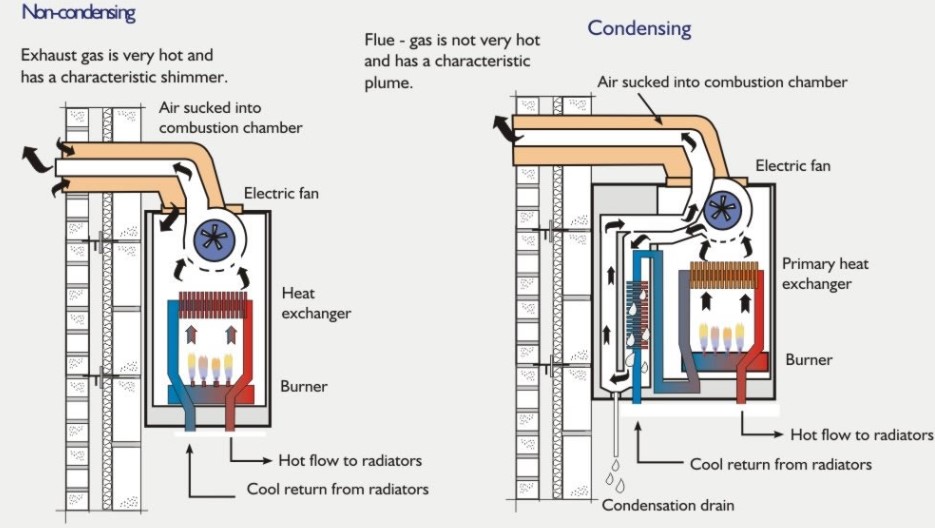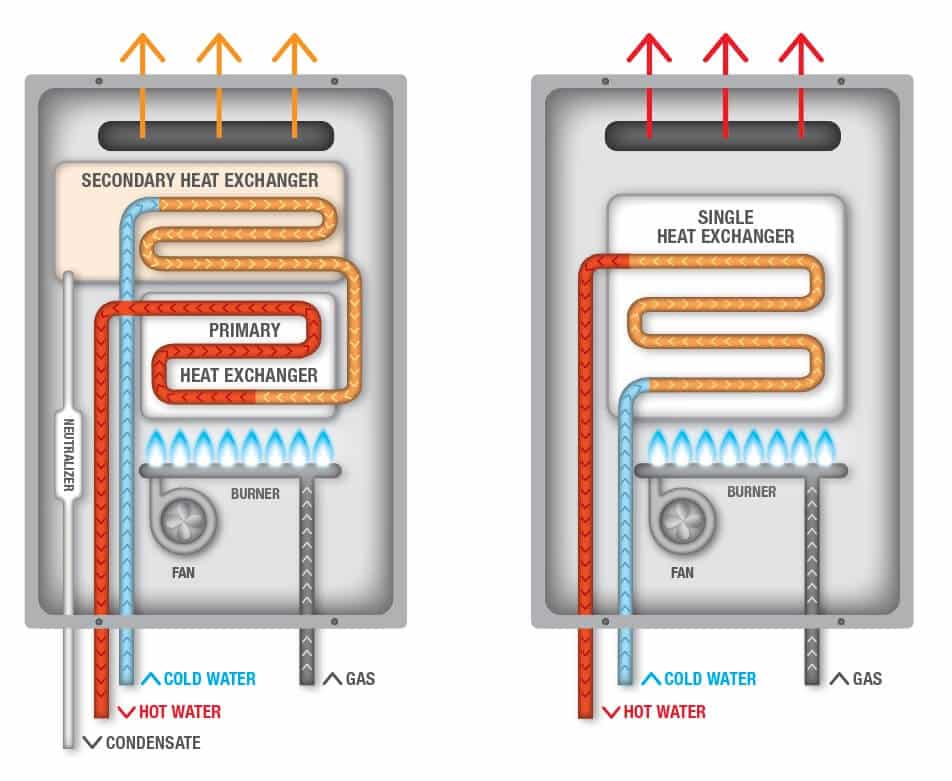When it comes to choosing the right tankless water heater for your home, the decision can be overwhelming. You’re faced with a myriad of options, and two terms that often pop up are “condensing” and “non-condensing.”
But what do these terms really mean for you and your home? Understanding the differences can not only impact your comfort but also your wallet and the environment. Imagine stepping into a hot shower with consistent water temperature, all while saving on energy bills.
Sounds appealing, right? By the end of this article, you’ll have a clear understanding of how condensing and non-condensing tankless water heaters work, and which one aligns perfectly with your needs. So, if you’re ready to make an informed decision that benefits both your home and budget, keep reading. We promise to break it down in simple terms, making it easier for you to choose wisely.
Condensing Tankless Water Heaters
Condensing tankless water heaters are gaining popularity in modern homes. They offer an efficient way to provide hot water without the bulk of traditional tanks. These heaters utilize advanced technology to maximize energy savings and minimize waste.
How They Work
Condensing tankless water heaters use a secondary heat exchanger. This allows them to capture residual heat from exhaust gases. The captured heat helps preheat incoming water, increasing efficiency. This process reduces energy consumption, saving on utility bills.
Efficiency And Performance
These heaters boast high efficiency ratings. They can achieve efficiencies above 90%. Their performance excels in delivering consistent hot water. They maintain stable temperatures even with multiple taps running. The design ensures minimal heat loss, enhancing overall performance.
Pros And Cons
Pros include significant energy savings, compact size, and continuous hot water. They are environmentally friendly, reducing greenhouse gas emissions. Maintenance is straightforward, often requiring less upkeep than traditional models.
Cons involve higher upfront costs and complex installation. They require proper venting systems due to exhaust handling. Some models may need professional maintenance for optimal performance.

Credit: www.theexaminernews.com
Non-condensing Tankless Water Heaters
Non-condensing tankless water heaters are more affordable but less efficient than condensing models. They release hot exhaust gases, needing proper venting. Condensing versions recycle this heat, offering better energy efficiency.
Non-condensing tankless water heaters have been a staple in many households for their simplicity and efficiency. Unlike their condensing counterparts, these units focus on delivering hot water directly without reusing exhaust heat. You may have seen them in older homes or even in your own, quietly doing their job. But what exactly makes them tick? And are they the right choice for your home?Mechanism And Operation
At the heart of a non-condensing tankless water heater is a straightforward mechanism. Cold water enters the unit and passes over a series of heated coils, quickly raising the water temperature. Once heated, the water flows directly to your taps. There’s no holding tank, which means you’re not paying to keep gallons of water hot all day. This can be a significant advantage if you’re looking to cut energy costs. However, the exhaust gases produced during this process are released immediately, which can lead to higher energy waste.Energy Efficiency
Non-condensing units offer immediate energy savings compared to traditional tank heaters. Because they only heat water as needed, there’s no standby heat loss. But, they do vent hot gases that could otherwise be reused, which means they’re not as efficient as condensing models. Consider your usage habits. If you have a small household, you might not notice the difference in efficiency. But for larger families, the energy savings could add up over time.Advantages And Disadvantages
Advantages: – Lower upfront cost: Non-condensing models are typically less expensive to buy and install. – Simpler design: This can mean fewer parts that might need repair or replacement. – Immediate hot water: No waiting for a tank to fill and heat up. Disadvantages: – Higher long-term energy costs: Due to the venting of hot gases. – Potential need for stainless steel venting: The hot exhaust can require more durable materials, which might increase installation costs. – Limited efficiency: If you’re looking for maximum energy savings, you might consider condensing units. Have you ever thought about the balance between initial costs and long-term savings? It’s a question that often comes up when deciding on the best water heating solution for your home. As with many decisions, weighing the pros and cons based on your specific needs and lifestyle is key.Comparing Condensing And Non-condensing
Choosing between condensing and non-condensing tankless water heaters can be tough. Each type offers unique benefits for homeowners. Understanding their differences helps make informed decisions.
Cost Differences
Condensing heaters often cost more upfront. Their advanced technology makes them pricier. Yet, they save money over time. Non-condensing heaters usually have a lower initial cost. They might lead to higher energy bills, though.
Installation Requirements
Installing condensing heaters can be complex. They need special venting systems. This might require professional help. Non-condensing heaters are simpler to install. They need less venting and can fit in more spaces.
Environmental Impact
Condensing heaters are eco-friendly. They use energy efficiently, reducing emissions. Non-condensing heaters may release more exhaust gases. Choosing a condensing heater supports a greener environment.
Credit: www.tanklesshotwaterguide.ca
Choosing The Right Heater
Deciding on the right tankless water heater can be challenging. Many options exist. Two main types stand out: condensing and non-condensing. Each has its benefits. Understanding them is key to making an informed choice.
Factors To Consider
Consider the size of your home. Larger homes need more power. Think about the climate in your area. Cold climates may need a more efficient heater. Check the installation space. Some heaters require more room.
Budget And Cost Analysis
Condensing heaters cost more initially. But they save on energy bills. Non-condensing heaters are cheaper upfront. Yet, they may cost more in the long run. Consider long-term savings versus initial costs.
User Preferences
Some prefer eco-friendly options. Condensing heaters emit less carbon. Others prioritize ease of installation. Non-condensing models can be simpler to install. Think about maintenance needs. Some heaters require more upkeep than others.
Maintenance Tips
Maintaining your tankless water heater ensures optimal performance and longevity. Both condensing and non-condensing models require regular attention. Adhering to simple maintenance tips can save you time and money. It also prevents unexpected breakdowns.
Routine Checks
Inspect the unit every few months. Check for leaks and loose connections. Ensure the venting system is clear and functioning. Clean the air filter to prevent dust buildup. Examine the temperature settings for accuracy.
Troubleshooting Common Issues
Low hot water flow? Check for blockages in the pipes. Unusual noises? Sediment buildup could be the cause. For error codes, refer to the manual. It provides specific solutions. Always reset the unit after troubleshooting.
Extending Lifespan
Descale your heater annually. This prevents mineral deposits. Use a water softener if necessary. Regularly flush the system to remove debris. These practices extend the life of your unit.

Credit: mossawistudios.com
Latest Innovations
The world of tankless water heaters is evolving rapidly, bringing new innovations to enhance efficiency and performance. Condensing and non-condensing models each have their unique benefits, but recent technological advancements are reshaping how we think about these systems. As you consider which type might suit your needs, it’s crucial to stay informed about the latest innovations.
Technological Advancements
Manufacturers are pushing boundaries with cutting-edge features like smart controls and enhanced heat exchangers. Smart controls allow you to adjust water temperature remotely via your smartphone. This means you can have a warm shower waiting when you get home. Enhanced heat exchangers improve energy efficiency, reducing your utility bills. Imagine saving money while enjoying endless hot water.
Additionally, some models now incorporate self-diagnostic systems. These systems alert you to potential issues before they become problems, ensuring uninterrupted service. Have you ever had a water heater fail on a cold morning? These innovations aim to prevent that.
Market Trends
The demand for tankless water heaters is growing, with condensing models gaining popularity due to their superior efficiency. Consumers are increasingly eco-conscious, seeking products that reduce carbon footprints. Condensing units fit this trend perfectly, offering up to 98% efficiency compared to non-condensing models.
Non-condensing units still hold a significant market share, particularly in regions where initial installation costs are a primary concern. But as technology advances, the gap between initial costs is closing. Are you prioritizing long-term savings or upfront affordability?
Future Outlook
Looking ahead, expect even more smart features and increased efficiency. The integration of AI and machine learning could predict your usage patterns, optimizing performance and saving energy. Imagine a water heater that knows your routine and adjusts accordingly.
As sustainability becomes more critical, manufacturers will likely focus on eco-friendly designs and materials. Could a tankless water heater contribute to your home’s sustainability goals? The future promises innovative solutions that align with modern lifestyles and environmental concerns.
Frequently Asked Questions
What Is A Condensing Tankless Water Heater?
A condensing tankless water heater uses heat from exhaust gases. It increases efficiency and saves energy.
How Does A Non-condensing Tankless Heater Work?
A non-condensing tankless heater heats water directly. It vents hot gases outside, which reduces efficiency.
Which Type Is More Energy-efficient?
Condensing models are more energy-efficient. They capture heat from exhaust gases and use it to heat water.
Is Maintenance Different For These Heaters?
Yes, condensing models need more maintenance. They have more parts that require cleaning and inspection.
Which Heater Is More Cost-effective?
Condensing heaters are initially costly but save energy long-term. Non-condensing are cheaper upfront but less efficient.
Conclusion
Choosing between condensing and non-condensing tankless water heaters involves key considerations. Condensing models offer higher efficiency and lower emissions. They can save energy costs in the long run. Non-condensing units are simpler and often less expensive upfront. They still provide reliable hot water on demand.
Consider your budget and home needs before deciding. Both types have their benefits. Research and compare options carefully. Consult with a professional for personalized advice. A well-informed choice ensures comfort and efficiency. Embrace the convenience of tankless technology today. Enjoy endless hot water with the right heater choice.





